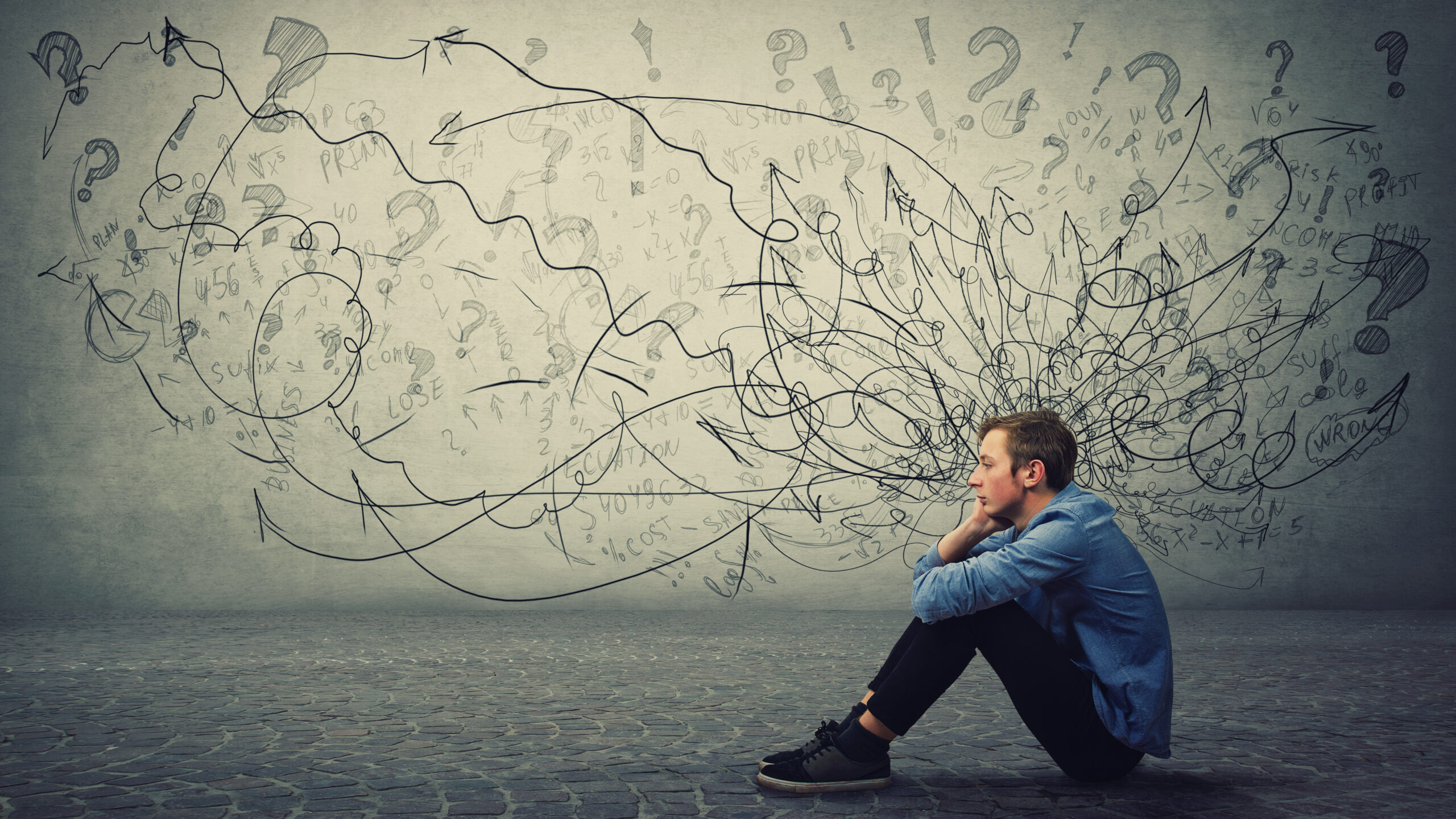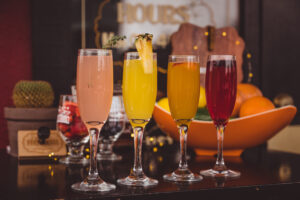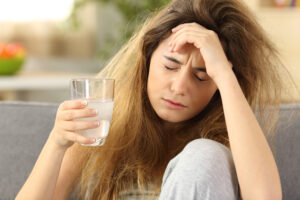Updated on December 28, 2022
Table of Contents
What is Hangxiety?
Have you ever woken up after a night of drinking and felt terribly anxious? The dread washes over you and you can’t get out of bed? You’re not alone. Anxiety has long been a symptom of hangovers, but the term ‘hangxiety’ has recently grown in popularity to describe it. If you drink alcohol, you’ve likely experienced hangxiety at least once.
According to research, about 12% of people who drink alcohol will experience hangover anxiety. While we commonly associate hangover symptoms with physical problems like headaches and nausea, alcohol can take a toll on our mental health, as well. Let’s talk about mental health and alcohol and what we can do to take care of ourselves.
Drinking Alcohol and Mental Health
Before we dive into hangxiety, it’s important to understand how alcohol can affect mental health. This is a topic that’s been heavily researched. A study found that heavy alcohol consumption can:
- Lower your mood
- Disrupt sleep
- Increase anxiety
- Cause emotional fatigue
These effects may last for a short time, or can linger. They may even affect your day to day life. If you drink regularly, alcohol can interfere with the chemicals in your brain that are in charge of keeping you in a state of good mental health.
It can be difficult to accept that alcohol is a depressant when you’re actively drinking. At first, alcohol makes us feel relaxed, confident and less anxious. The truth is, however, that the feeling will go away and disrupt the balance in your mind.
What is Hangxiety?
Have you ever felt anxious and cracked open a bottle of wine? It’s a typical reaction as the initial feeling you get is going to put you at ease. The term ‘liquid courage’ embraces the idea that alcohol will make you less anxious and more confident. Some of the most common symptoms of anxiety are:
- Feeling overwhelmed
- Existential dread
- Inability to focus
- Thoughts of paranoia
- Feeling depressed and anxious
- Being embarrassed about your actions the night before
While you’re throwing back shots at the bar, you’ll feel on top of the world. If you’re feeling anxious the next morning, you’re experiencing hangxiety. Hangxiety isn’t a medical term, but it’s describing a very real thing that people go through. There are several reasons why you might be experiencing hangxiety the morning after a night out.
What Causes Hangxiety?
You Have Social Anxiety
Research suggests that if you already have anxiety, you’re more likely to experience hangxiety. So, if you have social anxiety, you probably find that a few drinks helps you loosen up in a group. You might even have one or two before you head out for the night. You’ll feel relaxed at first, but as your body starts to metabolize the alcohol, your anxiety will come back.
Alcohol Detox
Hangxiety can start to occur when the effects of alcohol start to wear off. This can create symptoms similar to that of someone who is experiencing alcohol withdrawal. The flood of endorphins you received while you were drinking alcohol is gone, and you’ll feel drained.
This is because your body is working to get back to homeostasis. A night of drinking can take a lot out of you, mentally and physically.
High Cortisol Levels
Cortisol, also known as the stress hormone, may cause hangxiety as well. Drinking alcohol can increase cortisol production in the body. Excess cortisol can cause health problems such as hypertension, lowered immune system and metabolism problems. It can also cause mood swings, depression and higher levels of anxiety. With that being said, high cortisol levels from drinking could be contributing to hangxiety the morning after a night out.
Dehydration
Being dehydrated could be another factor that causes hangxiety. Alcohol is a diuretic, which means you’re going to lose a lot of water while you’re out. Think about how many times you go to the bathroom when you’re out drinking. It makes sense why you wake up the next morning feeling like a raisin.
Research suggests that dehydration can contribute to feelings of anxiety, as well as mood swings. Staying hydrated before, during and after a night out is one of the best things you can do for yourself if you plan on drinking alcohol.
Poor Sleep
Alcohol affects your sleep no matter how much you drink. You won’t get quality rest after a night out, and you probably went to bed pretty late anyway. According to The Sleep Foundation, anxiety is commonly connected to sleeping problems. So getting an appropriate amount of sleep could be the answer to lessening hangxiety.
Dealing With Hangxiety
Once the hangxiety sets in, it can feel like it’ll never end. You’re sitting there unable to get out of bed running through every single thing you did last night thinking your friends hate you (we promise you, they don’t.) Remember, there’s no cure for a hangover so you’re going to have to face the consequences of your actions. There are, however, ways to copy with hangxiety and make it less draining.
If you already have anxiety, you probably already have tricks up your sleeve to cope. If not, we have some methods that may help you handle hangxiety so it doesn’t ruin your entire day.
Take Care of Physical Symptoms
The first thing you should do is tackle the physical symptoms you’re dealing with. The mind and body are connected, and one won’t feel better without caring for the other. Get out of bed, drink some water, and take a walk. Make yourself a nutritious meal and focus on caring for yourself, instead of your racing thoughts.
Try Breathing Exercises
When you’re dealing with hangxiety, it can be hard to catch your breath. Your heart is racing, and it feels like there’s no end in sight. Take some time to slow down and breathe. Inhale, hold it and count to 4, then exhale. Doing this will help you get back in tune with your body and calm yourself down.
Talk to Your Friends
Sometimes hangxiety centers around how you were behaving the night before. Most of the time, you didn’t do anything wrong. Talk to your friends to get some perspective on what the night was actually like. 9 times out of 10 just hearing someone else tell you not to worry about it will make you feel better.
Spending time thinking in circles about what happened is only going to make matters worse. Talking to someone should get you some reassurance.
How Do I Prevent Hangxiety?
Unfortunately, if you have another type of anxiety, hangxiety may continue to haunt you. There are ways, however, that you can potentially lessen how bad it will be the next day.
For example, don’t drink on an empty stomach. Alcohol will absorb into your bloodstream faster and make matters worse in the morning. You should also be sure to drink water while you’re out to stay hydrated.
Set a limit on how many drinks you can have, and go home at a reasonable hour for rest. A good night’s sleep paired with hydration may help keep hangxiety at bay.
If you find yourself experiencing hangxiety quite often after drinking, it may be time to take a look at your habits. Never be afraid to seek out a medical professional’s advice if it seems to be getting bad.
As always, please drink responsibly and don’t forget to have fun. Cheers!




